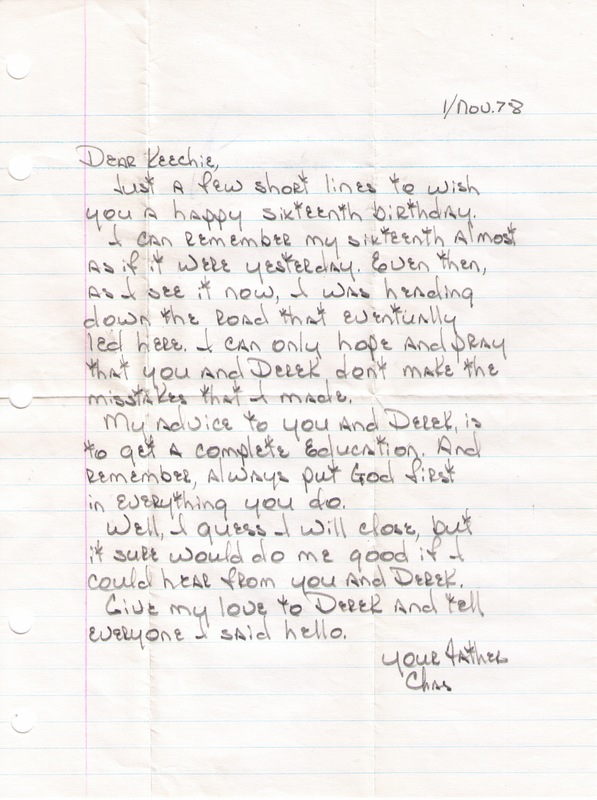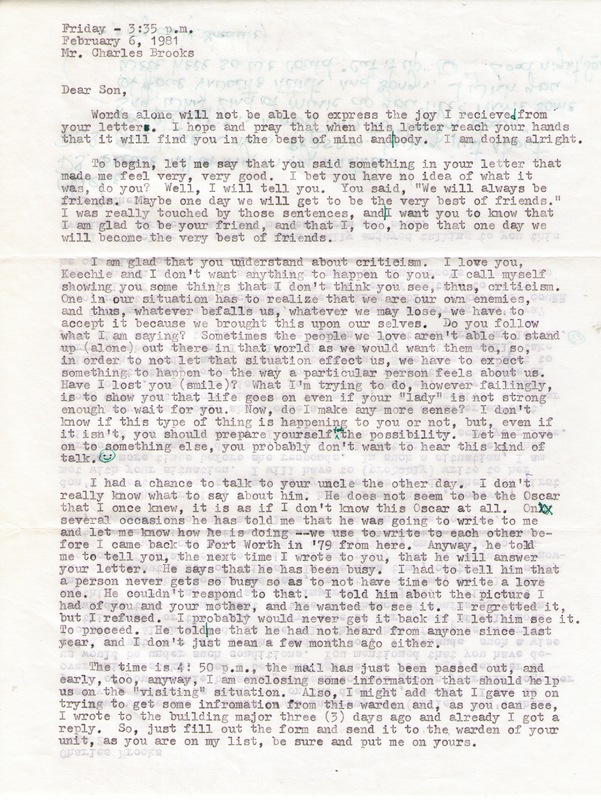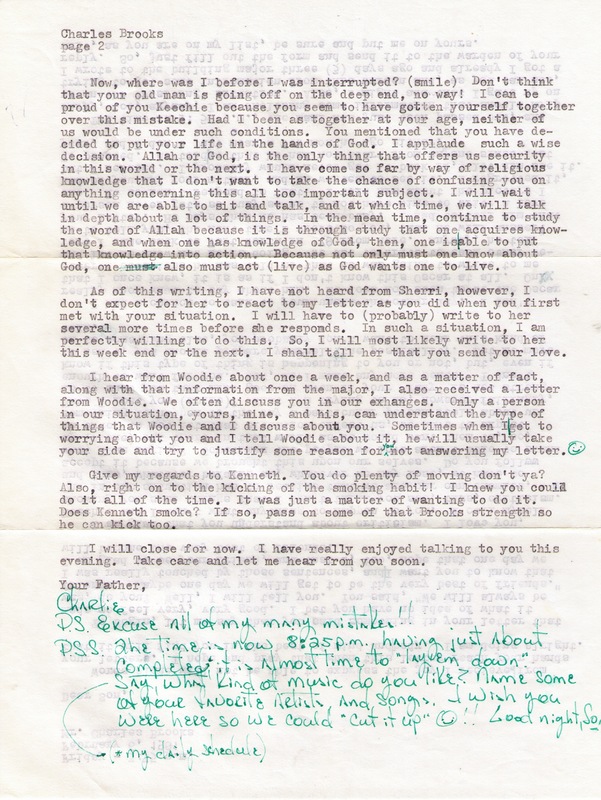The Right to a Fair Trial, the Right to Family, and the Case of Charlie Brooks Jr.
“Everyone charged with a penal offense has the right to be presumed innocent until proved guilty according to law in a public trial at which he has had all the guarantees necessary for his defense” Article 11 Section 1, Universal Declaration of Human Rights
"No one shall be subjected to arbitrary interference with his privacy, family, home or correspondence, nor to attacks upon his honour and reputation. Everyone has the right to the protection of the law against such interference or attacks." Article 12, Universal Declaration of Human Rights
The role of a father is one of the most influential aspects in a son’s life. However, what happens when your father is convicted of murder and sentenced to death for a crime when he was never truly proven to be guilty? This was the reality for the family of Charlie Brooks Jr. Specifically, Charlie left behind his two sons, Derrek and Adrian Keith Brooks while he was behind bars and eventually killed by lethal injection. Not only were they left without such an important figure in their lives, they were left with unanswered questions and feelings of anger. The only way they were able to continue a relationship with their father was communicating through letters. Written in these letters were the only fatherly advise Charlie could offer. Charlie was arbitrarily removed from his family before he was given a chance to a fair trial. Although being put through such a tragedy by their father, it is evident that his sons believe in his innocence.
In the oral history of Derrek Brooks, the love he has for his father and the passion he has to fight for his case shines through. He told anecdotes with tears in his eyes hoping to prove his father’s true character. Although he acknowledges his father’s problem with addiction, he knew his father was not a murderer and not given a fair trial. In the oral history, he explained the crime that his father was involved in. He goes on to say that, “But from what I was told, my father was not inside the room, he was standing outside. And we have witnesses at the time of his trial that verified that. However, the prosecutor, or I guess the defense attorney, never interviewed anybody - any of the witnesses - to prove, you know, that he was not in there, to prove the fatal shot” (4:02). This clearly indicates a violation of Charlie Brooks Jr.’s human rights. His trial had no specific evidence to truly find him guilty and sentence him to lethal injection. Derrek continues to explain that one of his main goals is to get a DNA test completed, so that if the test comes back and says that his father is innocent then he can exonerate his name posthumously (11:21).The fact that Derrek Brooks has to collect the evidence to prove his father innocent after his father has already been sentenced to death shows the violation of Article 11 section 1. Charlie Brooks Jr. was never truly proven to be guilty. Even Supreme Court Justice Thurgood Marshall was outraged that the Supreme Court voted in favor for Charlie Brooks Jr.’s death before his “appeals process was exhausted” (5:02). All of this information continues to prove the direct violation of Article 11.
This injustice not only took Charlie Brooks Jr.’s life, it took him away from his family.
Article 12 of the Universal Declaration of Human Rights states that one cannot be subjected to arbitrary interference with his family. Because Charlie Brooks Jr. was not granted a fair trial, he was arbitrarily taken from his family, a direct violation of his right. The only way Charlie could be the best father he could was through his letters to his sons. In one letter Charlie wrote to Keith, Friday, February 6th, 1981, he opens the letter by explaining, “words alone will not be able to express the joy I receive from your letters” and also says, “I hope one day we will become the very best if friends”. These short sentences alone show the love that Charlie has for his son. In addition to this, Charlie expresses how he is so proud of his son for fixing his own mistakes. He even talks about his guilt that if he had fixed his own mistakes earlier on before the actual crime, none of these terrible things would have occurred. He tries to be fatherly when he advises Keith to put his life in the hand of God. He feels that if Keith is able to do this, he will lead a happier and more fulfilled life. In another letter written to Keith on November 1, 1978, Charlie wished his son a happy sixteenth birthday. He reflects on his own sixteenth birthday, however, goes on to state that, “As I see it now, I was heading down the road that would eventually lead me here”. Charlie continues to give both of his sons advise to avoid the mistakes he made by getting a complete education and putting God first in everything they do. He closes the letter by indicating that it would, “do him good if he could hear from Keith and Derrek”. Both letters indicate the love Charlie has for his sons. Both letters also contain a slight tone of guilt that Charlie has from not being active in their lives from being in jail. Charlie wants his sons to be educated and full of God because he feels that would steer them away from mistakes like his own. These letters, full of their fatherly advise and guilty tone connect to the violation of Article 12. Charlie feels responsible for not being a stronger father figure because he was taken from his family by the law. However, he was technically taken arbitrarily because this may have never happened if he was given a fair and thorough trial.
Both of these articles, although different, can easily be intertwined. By applying these articles together to a specific situation, it shows that one violation of human rights can lead to an entire cascade of violated human rights. If Charlie Brooks Jr. was granted a fair trial in the first place, maybe he wouldn't have been removed from his family entirely and he would not have to be a father through letters. In addition to this, while applying these articles it also shows that these articles are not black and white. They can be applied to various situations, especially like this one where the violation of Article 12 may not have been apparent. Although the UDHR was written so long ago and has helped many people, it still contains many flaws. In a contemporary setting, human rights are still being violated and innocent people are becoming subjected to injustice. Charlie Brooks Jr.’s case specifically shows that the world still needs help in ensuring that these human rights are truly indestructible and universal.
By: Grace Wilgucki



